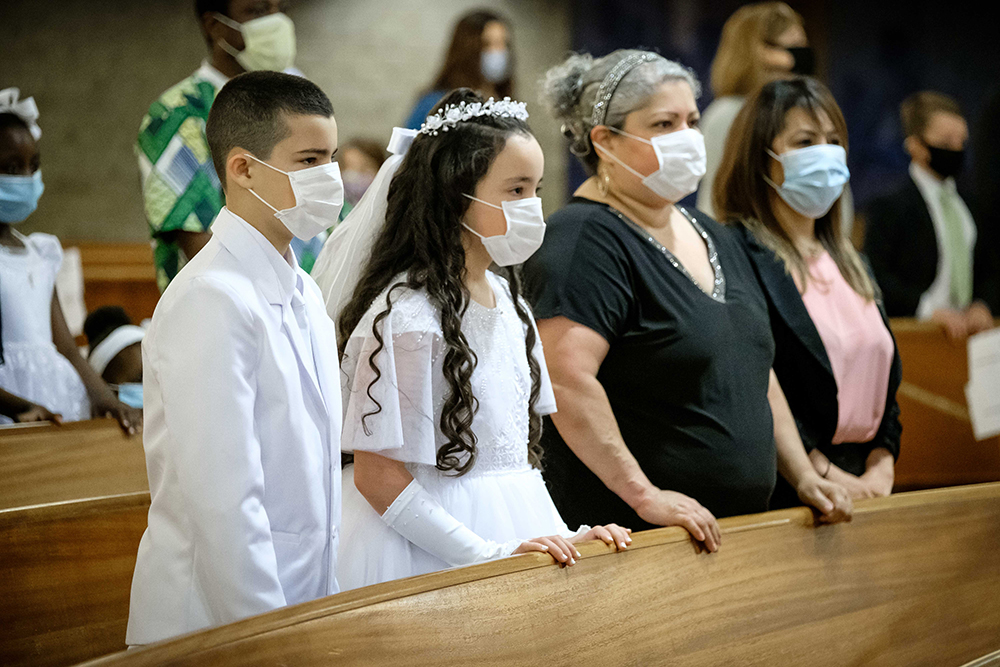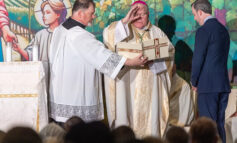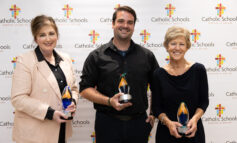
Andrew Vance Mitchell and Jade Norabelle Mitchell stand with family during celebration of a First Holy Communion Mass at All Saints Catholic Church in Dallas on Saturday, May 16, 2020. (Photo by Kevin Bartram)
By Father Thomas Esposito
Special to The Texas Catholic
The modern Greek word for “Thank you,” eucharisto, immediately calls to our Christian minds the gift of Christ’s body and blood, commemorated in our Eucharistic liturgy. The proper response to eucharisto today might not be as recognizable, but it is equally rich in theological meaning. The word parakalo, which functions as “You’re welcome” in contemporary Greek, has at its core a wide variety of connotations, among them legal defense or advocacy, consolation, encouragement, comfort. In a strangely beautiful way, these words for “Thank you” and “You’re welcome” introduce us into the mysterious relationship between two persons of the Trinity: the Son and the Holy Spirit.
Jesus himself, the giver of his own Eucharistic flesh and blood (see John 6:48-58), encourages his disciples at the Last Supper, assuring them that the Father will send in his name a Parakletos – an advocate, a comforter – after his death and resurrection (John 14:16-17, 26). This is the primary name Jesus employs in the Gospel of John to describe the Holy Spirit. The Parakletos is “the spirit of truth” who will teach the disciples and testify to the love between the Father and the Son (John 14:26; 15:26). Jesus pledges that the Spirit of truth coming after him will share what the Father wants to share with his disciples: the very life and glory of God (John 16:7-15; see also 1 John 1:1-3). The modern Greek language thus gives us a lovely insight into the inner workings of the Trinity. God the Father allows us to say eucharisto, “Thank you,” for the Son’s gift of his body and blood, and Jesus the Son in turns tells us parakalo, “You’re welcome,” by means of the Holy Spirit.
But what exactly does the Holy Spirit do? We can easily lose ourselves in these lofty musings beyond the veil of our limited understanding, but Jesus thankfully (eucharisto-ly?) invites us into this communion of love. He reveals the essence of this communion by asserting that we are to do exactly as the Spirit does: “When the Parakletos comes whom I will send you from the Father, the Spirit of truth that proceeds from the Father, he will testify to me. And you also testify, because you have been with me from the beginning” (John 15:26-27). By guiding us into “all truth” (John 16:13), the Holy Spirit equips us to testify to the sacrificial love of Christ that inspires our faith and hope, and encourages us to inspire in others that shared faith and hope.
Although St. Paul does not refer to the Holy Spirit as the Parakletos, he certainly understands the graced logic of our imitation of the divine communion. Paul, not-so-subtly hammering home the same root word five times in one sentence, praises the Father as “the God of all encouragement [paraklesis], the one encouraging [parakalon] us in our every affliction so that we can encourage those in affliction through the encouragement by which we ourselves are encouraged by God” (2 Corinthians 1:3-4). If you need any paraklesis when suffering threatens to rupture your calm or even your relationships with God and others, let Paul’s sustained focus on this single word be a constant source of grace: “For as Christ’s sufferings overflow to us, so through Christ does our encouragement also overflow. If we are afflicted, it is for your encouragement and salvation; if we are encouraged, it is for your encouragement, which enables you to endure the same sufferings that we suffer. Our hope for you is firm, for we know that as you share in the sufferings, you also share in the encouragement” (2 Corinthians 1:5-7).
The work of the Spirit is rarely detected by human and material measurements (see John 3:8), and we are often reluctant to invoke the Paraclete’s help precisely when we fail to see any worldly cause for encouragement. That is why, with Pentecost approaching, we must become mindful of our divine manners: let us always remain faithful in seeking the Son’s eucharisto and the Spirit’s consoling parakalo to our prayers and perseverance!
Father Thomas Esposito, O.Cist., is a monk at the Cistercian Abbey of Our Lady of Dallas and teaches in the theology department at the University of Dallas in Irving.



